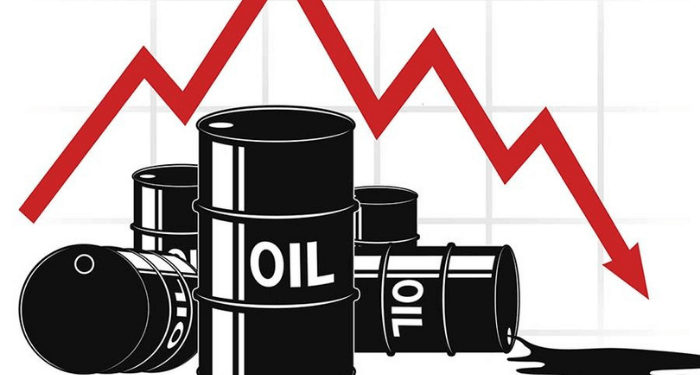How oil receipts declined from $3bn to zero
The official foreign exchange receipt from crude oil and gas sales into Nigeria’s official reserves has dried up steadily from about $1.9 trillion in 2014 to an absolute zero dollars today, data from the Central Bank of Nigeria (CBN) have shown.
Experts have proffered several reasons for this decline, ranging from falling oil and gas production, rising payments for petrol subsidies and ballooning government costs.
The issue, which has been simmering since the past seven years, became a hot button issue when Godwin Emefiele, governor of the CBN, said the official FX receipt from crude oil sales into the official reserves has dried up steadily from above $3.0 billion monthly in 2014 to zero dollars today.
The following numbers reveal the rate at which crude oil and gas sales going into the Federation Account declined in Africa’s largest economy, using data sourced from the CBN, noting the factors that account for their drop in the prevailing years.
$1.9 trillion (2014)
In 2014, $1.9 trillion earned from crude oil and gas sales was transferred into Nigeria’s reserves. That same year, the country pumped on average about 1.962 million barrels per day (bpd), according to the Organization of the Petroleum Exporting Countries (OPEC).
BusinessDay Research and Intelligent Unit reported in 2014 that India’s import of Nigeria crude oil reached 116.8 million barrels in 2014.
$898 billion (2015)
Crude oil and gas sales fell to $898 billion in 2015 as the average oil output fell to 1.88 million bpd from 1.96 million bpd in 2014. Nigeria was preparing for the general elections and agitations were already rising in the Niger Delta, crimping oil production.
$389 billion (2016)
By the first quarter of 2016, the global oil market was on the brink of crises as global supply outpaced demand, leading to a slump in oil prices to below $30 per barrel.
According to OPEC data, Nigeria’s annual average production declined to 1.556 million bpd in 2016 from 1.88 million bpd.
In January that year, gunmen blew up an oil pipeline belonging to Italy’s Eni in the Delta, killing three workers, according to officials.
The next month, Niger Delta militants calling themselves Movement for the Emancipation of the Niger Delta, staged an underwater attack on a Shell pipeline, shutting down the 250,000 barrel-a-day Forcados export terminal.
To halt oil decline, OPEC and non-OPEC countries including Russia agreed on a pact that will eventually prove to rescue global oil markets.
$795 billion (2017)
Rising from a turbulent 2016, where crude prices found the floor at $30 per barrel and militants were blowing up pipelines, 2017 marked a significant recovery for the sector.
The Forcados oil terminal restarted. Few months after the Forcados terminal came on stream, Nigeria was able to ramp up crude oil production to 1.8 million bpd from below 1.5 million bpd recorded for much of 2016.
2017 witnessed a flurry of policy approvals including the national oil and gas policies. In August that year, a landmark Gas Sales & Aggregation Agreement with Greenville LNG for 74MMscf gas delivery to a $500 million LNG facility located in Rumuji, River State was signed between Nigeria and investors due to the gas policy.
Nigeria came under the OPEC+ pact, which placed a cap on the country’s production.
$415 billion (2018)
In 2018, crude theft began to become the new normal. Nigeria lost a total of 53.281 million barrels valued at $3.837 billion (applying an average price of $72.01) to crude oil theft and sabotage.
This is an increase of 46.15 percent when compared to 2017 volumes of 36.457 million barrels. Shell lost about 57 percent of its total production of 62 billion barrels in 2018 to crude oil theft, while Chevron lost about 2.6 billion barrels from its output 62.8 billion barrels.
Seplat lost about 1.7 billion barrels from its total 2018 oil production of 8.7 billion while NewCross lost about 1.1 billion barrels from its total oil production of 6.1 billion.
Independents began shuttering oil fields and oil majors started entering discussions to sell off their onshore assets as they decreased oil production activities in them.
Read also: More pain for Nigeria’s economy as FG admits loss of biggest crude buyers
$398 billion (2019) and $356 billion (2020)
As the average annual oil production fell from 1.78 million bpd in 2019 to 1.575 bpd in 2020, crude oil and gas sales dropped by 10 percent due to struggles in producing oil.
COVID-19 decimated global oil markets as governments across the world shuttered their economies to halt the spread of the rampaging pathogen.
Nigeria’s oil production declined rapidly in 2020 as oil companies in the country also shut operations. Production suffered and declined below 1.4 million bpd.
$35 billion (2021)
By 2021, Nigeria was unable to meet its OPEC+ quota as production hovered around 1.2 million bpd.
Crude theft began to occur on an industrial scale, leading independents to shut their fields. Heirs Holding and other producers started to lament the impact of oil theft on their productions.
Oil majors that were contemplating leaving Nigeria hardened their resolve and began moving investments elsewhere. ExxonMobil, for example, had discovered lucrative fields in Guyana and were searching for independents to offload their onshore, shallow water assets.
Other countries were now being assigned Nigeria’s unused quota.
$0 (2022)
Revenues have dropped to zero as Nigeria now spends virtually all its crude earnings to pay for petrol subsidies.
The Nigerian National Petroleum Company Limited, after changing its logo and claiming it is now a commercial firm, began a campaign to force the government to tackle crude theft.
Investors had abandoned their oil fields, oil service firms were shuttering as businesses dried up and even the Nigeria LNG Limited, which secured a final investment decision on its Train 7 project, was impacted by crude theft.
The Nigerian Upstream Petroleum Regulatory Commission, in its oil production status report, showed that Nigeria produced less than 1 million bpd in August and September as Libya and Angola overtook the country.









